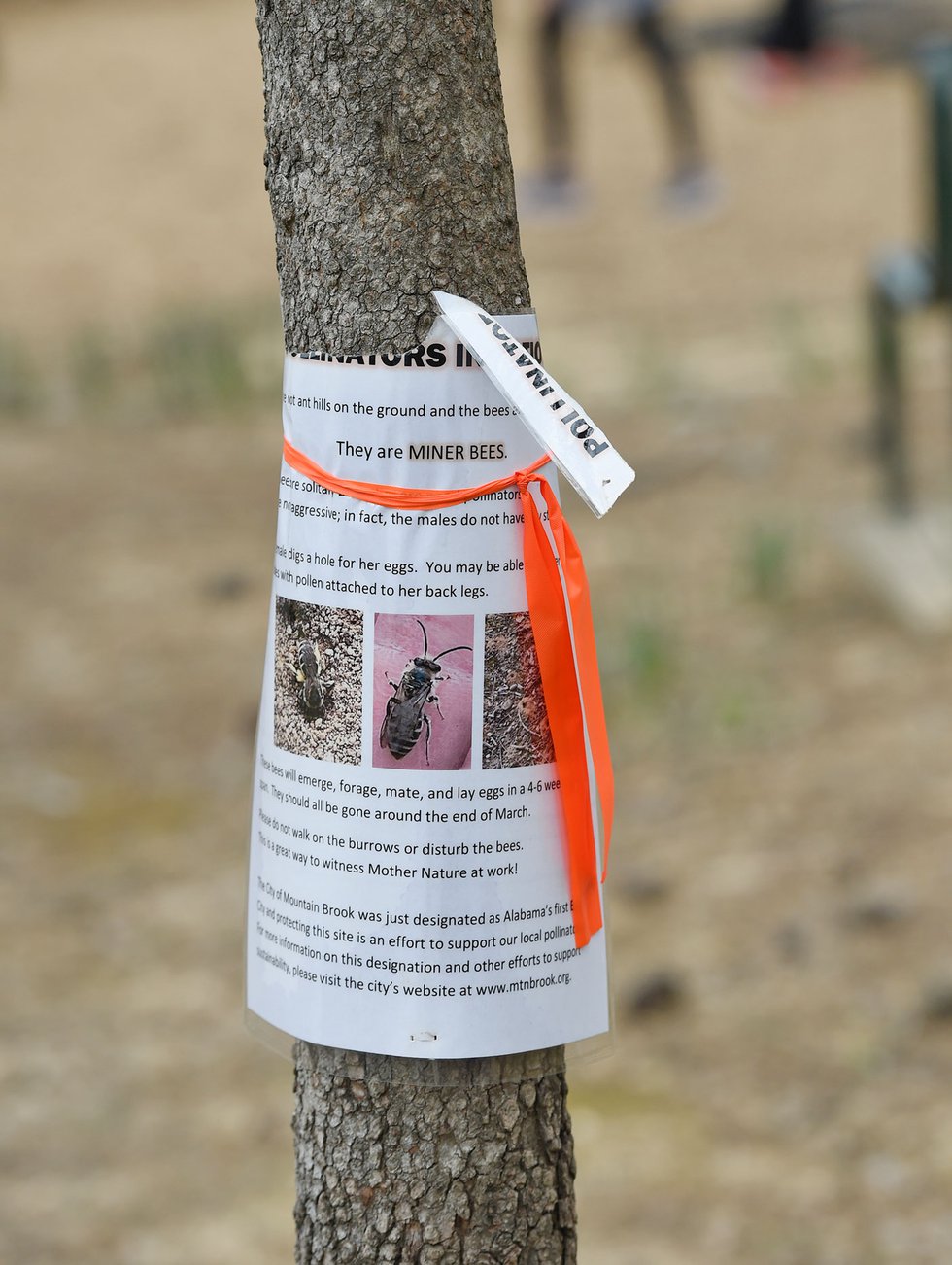Article by Grace Thornton. This article originally appeared in Village Living, Mountain Brook, Alabama’s community newspaper on May 1, 2023.

A sign displays information about the pollination period for miner bees at Canterbury Park. Mountain Brook was recently named a Bee City, the first in the state of Alabama. Photo by Erin Nelson.
Dana Hazen said in the past, when she’s gone to pick out plants for her garden, she’s bought whatever caught her eye, or she’s thought, “Does it go in the sun or the shade?”
But now she thinks about it differently, thanks to a Google trail she went down a few years ago on a topic she wouldn’t have expected — pollination.
“I had an interest in pollination personally, and I became a member of the Xerces Society,” said Hazen, director of planning, building and sustainability for the City of Mountain Brook.
And her research has affected much more than just her yard — it led to the City of Mountain Brook being designated Alabama’s first Bee City USA affiliate.
Hazen said connecting with Bee City USA — an initiative of the Xerces Society for Invertebrate Conservation — can make a bigger difference than Mountain Brook residents might think.
The U.S. is home to more than 3,600 bee species that through pollination are responsible for about a third of the food and drink people consume. And they’re in danger; research shows that up to 40% of pollinator species globally are at risk of extinction.
“Bee City USA is trying to get individual homeowners to realize that their yards and balconies and potted plants can have a huge impact on the ecosystem,” Hazen said.
The Bee City USA initiative provides a framework for communities to work together to conserve native pollinators by increasing the supply of native plants, providing nest sites and reducing the use of pesticides.
It’s a grassroots effort — it doesn’t flesh itself out in city ordinances, Hazen said. “It’s about educating people so that they might choose to do what they can, like limiting the amount of lawn they have and installing some native plants.”
The City of Mountain Brook itself is working to incorporate native plants in parks, road islands and other green spaces.
“We’re trying to think about how we are going to set an example for the community in this global effort and set an example for other municipalities as well,” Hazen said.
The city is also working to raise awareness of bee species among city leaders and residents.
Hazen said they recently had an incident where this kind of awareness paid off. The city got a call that yellow jackets were swarming at Canterbury Park, and when Shanda Williams, director of parks and recreation, went to deal with the issue, she realized they might not be yellow jackets after all.
“The beauty of having your phone — she was able to do research and figure out that they were miner bees,” Hazen said. “They’re not aggressive and they don’t sting, and they would only be there from four to six weeks.”
So city officials roped off the bees’ mounds — which look like ant hills — and put up signs to let everyone know not to disturb them.
“We want to encourage people to preserve bees however they can in their own yards, too,” Hazen said.
That includes watching out for mounds, planting native plants, waiting until later in the spring to mow and not immediately raking up all leaves in the fall.
“The leaves are important for the overwintering of the bees,” Hazen said. “We’re all about keeping things tidy, and we don’t realize we’re raking all of the next season’s pollinators out to the curb.”
She said they’re excited about continuing to educate the city’s residents as well as implementing new projects like a see-through bee hotel and pollinator garden on City Hall grounds.
“We’re fledging in our Bee City USA effort, but we’re excited about it,” Hazen said.
With this new designation, Mountain Brook joins 177 other Bee City USA affiliates across the nation and in Puerto Rico.
Alabama also has two Bee Campus USA affiliates, Auburn University and the University of Alabama at Birmingham. There are nearly 160 campuses partnering with the effort nationwide.
For more information, visit beecityusa.org or xerces.org.





